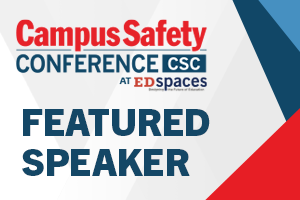Teaching is a challenging profession. It takes someone with myriad skills to pull it off. According to a recent study published in the Journal of Positive Behavior Interventions, 93% of the elementary teachers surveyed reported experiencing high stress levels in their profession (Herman et al., 2018). Then, to top it off, in this day and age, educators are put in the precarious position of having to worry about the possibility of an active shooter in their school.

Article author Vicki M. Abbinante, PhD will be presenting “How to Talk to Teachers about School Safety So They Want to Listen” at the Campus Safety Conference at EDspaces November 12-14, 2024, in Houston, Texas. For more information and to register, visit CampusSafetyConference.com.
When training for an active shooter event, teachers often say the following:
- “This is not fair.”
- “This is not what I signed up for.”
- “I just want to teach.”
- “Tell me it cannot happen here.”
- “That’s law enforcement’s job.”
It definitely is not fair, and any educator who has been teaching for a while could never have imagined in their wildest dreams that training for an active shooter event would be part of their job.
The likelihood of a school having an active shooter event may be quite low. However, so is the probability of a school having a tornado, and we still need to train for such an emergency.
Teachers Must Collaborate with Law Enforcement to Bolster School Safety
Is training for an active shooter event strictly law enforcement’s job? They certainly have the bulk of the knowledge, but is it their school? Of course not. School safety training needs to be a collaborative effort. Educators need to take ownership.
Teachers do not seem to understand, and few leaders in the school safety field have convinced them that teachers are uniquely equipped to take on this challenge.
Related Article: School Safety Impacts Student Achievement, Teacher Retention, New Survey Finds
Teaching, above all other professions, comes with the following remarkable attributes:
- Educators understand the need for repeated training. Teachers know that practicing your multiplication tables and your handwriting will result in muscle memory that can be recalled at a moment’s notice.
- Teachers are masters of “situational awareness.” In the world of education, it is called “reflection-in-action.” This practice can be described as an educator being engaged in a lesson, surveying the class to see students’ reactions, stopping amid the lesson, reflecting on the lesson, and making necessary adjustments. Countless teachers have depended on this spontaneous, intuitive practice of judging the effectiveness of a lesson for years (Schon, 1983). If teachers are already prepared to reflect-in-action during teaching situations, with training, they would be just as well prepared to engage in this practice during any crisis in a school safety situation.
- Teachers have an intrinsic desire to nurture students and a protective loyalty to students.
- Teachers have a history of creative problem-solving. In today’s school funding crises, educators are adept at making something out of nothing in the classroom. Often, creative problem-solving is necessary in the middle of a crisis.
- Teachers are champions at thinking under pressure. Some teachers quiet a class of 40 students and go on to discuss Shakespeare. There are groups of teachers who gain control of a cafeteria food fight and much worse. If they can think under everyday pressure, then in a crisis, they can think under that pressure when the stakes are much higher.
K-12 Administrators Should Leverage Teachers’ Strengths to Bolster Security
Leaders in the field of school safety and security have missed an invaluable opportunity to remind teachers of these remarkable attributes and how each of these qualities should empower teachers to take on responsibility for their own safety and the safety of their students.
Related Article: Teacher Shortages by State and How Schools Are Trying to Fix the Problem
Teachers also have a responsibility to empower themselves. Teachers who do not feel safe cannot teach. Students who do not feel safe cannot learn. In schools where teachers have been empowered, teachers and students do not fret over the possibility of an active shooter event. They are prepared, calm, and focused on academics (Abbinante, 2017).
Local teacher unions must be involved in training decisions before something negatively affects teachers. Educators must demand a seat at the table. In some states, a seat at the table is the law. However, few take advantage of the law. Teachers need to ask more questions and be more collaborative. Nobody knows their schools the way teachers do.
Vicki Abbinante is the lead professor of the school safety, security, and emergency management specialization at Sanford College of Education, National University.
Note: The views expressed by guest bloggers and contributors are those of the authors and do not necessarily represent the views of, and should not be attributed to, Campus Safety.
Article references:
- Abbinante, V. M. (2017). Policy decisions and options-based responses to active shooters in public schools (Doctoral dissertation, Walden University, 2017) (p. 240).
- Herman, K.C., Reinke, W.M., & Hickmon, J. (2018). Empirically derived profiles of teacher stress, burnout, self-efficacy, and coping and associated student outcomes. Journal of Positive Behavior Interventions, 20- 90-100.
- Schön, D. A. (1983). The reflective practitioner: How professionals think in action (Vol. 5126). Basic books.







